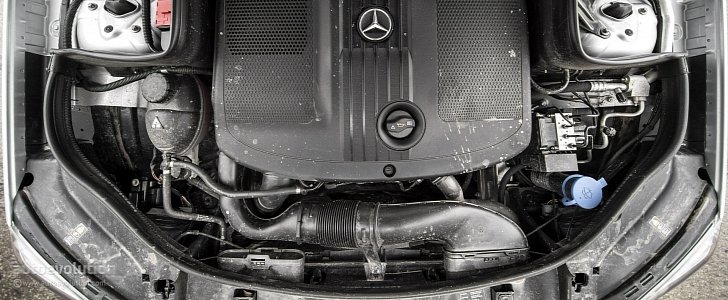The automotive industry of Germany was hit hard by the unruly Dieselgate shambles. Because of it, governmental agencies on the Old Continent have started their own witch hunts. The German government doesn’t make an exception because Deutschland is preparing for a 630,000-strong recall covering diesel cars. And no, these particular cars aren’t fitted with defeat devices to cheat emissions.
According to reports published today in the German media, including this one from Sachsische Zeitung, the Federal Motor Transport Authority (KBA) is in talks with Audi, Mercedes-Benz, Opel, Porsche and Volkswagen to recall 630,00 diesel-powered cars over the exhaust gas recirculation (EGR) system. The KBA found out that manufacturers set up the EGR system’s software to shut down at different temperatures to prolong the life of the parts involved. By doing this, a car emits more NOx than what it reads in the spec sheet.
For example, Mercedes-Benz diesel engines tested by the KBA shut down their exhaust gas recirculation system at 10 degrees Celsius. Opel diesel engines, on the other hand, shut down at 17 degrees Celsius. To put it simply, the EGR system works just fine during laboratory emission tests. In the real world, though, it doesn’t, because the weather is somewhat capricious in Western Europe. You know: rain, drizzle, snow, conditions that get the temperature below 17 degrees Celsius or 62 degrees Fahrenheit.
It is reported that the KBA didn’t find any other automaker except for Volkswagen to use manipulation techniques such as a defeat device. German Transport Minister Alexander Dobrindt declared today that irregularities were found at a broader number of automakers, findings that will be reported to the relevant authorities. Some of the cars deemed as problematic by the KBA include the following:
Alfa Romeo Giulietta (2.0-liter), Audi A6 (3.0 V6 TDI), Chevrolet Cruze (2.0-liter), Dacia Sandero (1.5-liter engine sourced by Renault), Fiat Ducato (3.0-liter), Ford C-Max (1.5-liter), Ford C-Max (2.0-liter), Hyundai ix35 (2.0-liter), Hyundai i20 (1.1-liter), Jaguar XE (2.0-liter Ingenium), Jeep Cherokee (2.0-liter), Land Rover Range Rover (3.0-liter), Mercedes-Benz V250 BlueTEC (2.1-liter), Nissan Navara (2.5-liter), Opel Insignia (2.0-liter), Opel Zafira (1.6-liter), Porsche Macan (3.0-liter), Renault Kadjar (1.5-liter), Renault Kadjar (1.6-liter), Suzuki Vitara (1.6-liter), Volkswagen Amarok (2.0-liter), Volkswagen Crafter (2.0-liter).
On an ending note, Bosch builds the EGR system for all the German automakers listed above. More info can be found in the press release below (translated from German by Google) and the PDF attachment under it.
For example, Mercedes-Benz diesel engines tested by the KBA shut down their exhaust gas recirculation system at 10 degrees Celsius. Opel diesel engines, on the other hand, shut down at 17 degrees Celsius. To put it simply, the EGR system works just fine during laboratory emission tests. In the real world, though, it doesn’t, because the weather is somewhat capricious in Western Europe. You know: rain, drizzle, snow, conditions that get the temperature below 17 degrees Celsius or 62 degrees Fahrenheit.
It is reported that the KBA didn’t find any other automaker except for Volkswagen to use manipulation techniques such as a defeat device. German Transport Minister Alexander Dobrindt declared today that irregularities were found at a broader number of automakers, findings that will be reported to the relevant authorities. Some of the cars deemed as problematic by the KBA include the following:
Alfa Romeo Giulietta (2.0-liter), Audi A6 (3.0 V6 TDI), Chevrolet Cruze (2.0-liter), Dacia Sandero (1.5-liter engine sourced by Renault), Fiat Ducato (3.0-liter), Ford C-Max (1.5-liter), Ford C-Max (2.0-liter), Hyundai ix35 (2.0-liter), Hyundai i20 (1.1-liter), Jaguar XE (2.0-liter Ingenium), Jeep Cherokee (2.0-liter), Land Rover Range Rover (3.0-liter), Mercedes-Benz V250 BlueTEC (2.1-liter), Nissan Navara (2.5-liter), Opel Insignia (2.0-liter), Opel Zafira (1.6-liter), Porsche Macan (3.0-liter), Renault Kadjar (1.5-liter), Renault Kadjar (1.6-liter), Suzuki Vitara (1.6-liter), Volkswagen Amarok (2.0-liter), Volkswagen Crafter (2.0-liter).
On an ending note, Bosch builds the EGR system for all the German automakers listed above. More info can be found in the press release below (translated from German by Google) and the PDF attachment under it.

